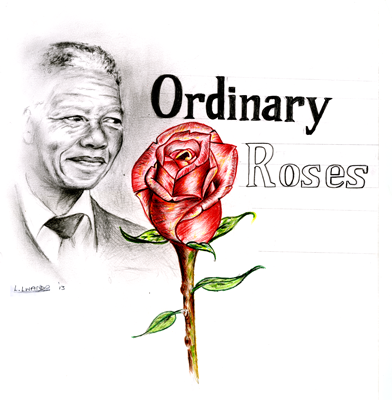I'm just launching this site now, getting materials ready. Here is a description of my first forthcoming products.
Contact me for more information and pre-orders.
Ordinary Roses is a forthcoming work--I interviewed 8 religious leaders in Port Elizabeth, South Africa and we worked on a quote each on H {joy and sorrow} |O {good and bad} | L {love and hate} | Y {safety and danger}. Then we translated one vital word in each quote into Rose--and discuss the results.
In December 2013, I was in South Africa--and going into the Victorian Park High School to work with my artists. As I walked in on that Friday morning, there was a keening, a wailing from the courtyard. All of the staff--whte and black--were there mourning the passing of Nelson Mandela. And I knew then I had to write this. And dedicate this work, which shows how all of us, Muslim and Jew, Christian and Pagan, are alike in our tears, our fears, our hopes, our loves. This work aims to bring people together by asking them to share their beliefs, their experiences with others—to help us all realize that, as Nelson Mandela says “we were not different people with separate languages; we were one people, with different tongues. “ (Long Walk to Freedom, page 78).
Llwando, a 16 year old self-taught boy from the Walmar Township, did the artwork:

Sample from Draft:
By the rivers of Babylon, we sat down and wept, when we remembered Zion. Psalm 137:1
This verse carries all of the weight of the suffering of the past. The next few verses lament this suffering as we were carried off as slaves, and wondered how we could ever sing in a foreign land. In the midst of all of this suffering, we vow not to forget Jerusalem, “If I forget thee, O Jerusalem, let my right hand forget her cunning (5) Let my tongue cleave to the roof of my mouth, if I remember thee not, if I set not Jerusalem of my chiefest joy.” We read this on Hannukah, a celebration to remember the light burning in the temple for eight days—when there was oil only enough for one. We read this to remember what we once had, to recount our suffering, to keep Jerusalem within our hearts and souls. But more than this, we must never forget Jerusalem as we know that the Lord will save us and bring us back into Jerusalem.
bakhak (we wept) |
We wept
|
Here the Rose translations explore the idea of we wept. In bakhianou, we are still in a place of fear, at the bottom of the world, with no place to go but up. Yet, even in this sorrow, we band together and we fight, so that we can reach that promise of a wonderful, ecstatic understanding of the Highest Truths. |
The “we” in the English “we wept” is rendered as weak and in the present, because we are still weak, we are still mourning. But what we mourn is the past—the strength of our suffering, the anger and frustration of our servitude. The “t” here is both possible and impossible—for we carry on, taking our burdens up and going on—even when that is impossible to endure. |

